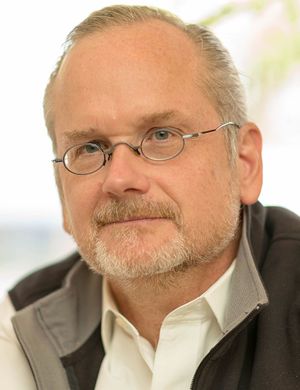Lawrence Lessig
( academic) | |||||||||||||||||||||
|---|---|---|---|---|---|---|---|---|---|---|---|---|---|---|---|---|---|---|---|---|---|
 | |||||||||||||||||||||
| Born | Lester Lawrence Lessig III June 3, 1961 Rapid City, South Dakota | ||||||||||||||||||||
| Nationality | US | ||||||||||||||||||||
| Alma mater | • Wharton School • Trinity College (Cambridge) • Yale University | ||||||||||||||||||||
| Children | 3 | ||||||||||||||||||||
| Spouse | Bettina Neuefeind | ||||||||||||||||||||
| Member of | Australian Davos Connection | ||||||||||||||||||||
| Interests | • copyright • open source | ||||||||||||||||||||
| Party | Democratic | ||||||||||||||||||||
Proponent of reduced legal restrictions on copyright, trademark, and radio frequency spectrum, particularly in technology applications.
| |||||||||||||||||||||
Lawrence Lessig is an American academic, attorney, and political activist who started the Creative Commons. He is the Roy L. Furman Professor of Law at Harvard Law School and the former director of the Edmond J. Safra Center for Ethics at Harvard University.[1]
Lessig is a proponent of reduced legal restrictions on copyright, trademark, and radio frequency spectrum, particularly in technology applications. In 2001, he founded Creative Commons, a non-profit organization devoted to expanding the range of creative works available for others to build upon and to share legally. Prior to his most recent appointment at Harvard, he was a professor of law at Stanford Law School, where he founded the Center for Internet and Society, and at the University of Chicago. He is a former board member of the Free Software Foundation and Software Freedom Law Center; the Washington, D.C. lobbying groups Public Knowledge and Free Press; and the Electronic Frontier Foundation.[2]
Contents
Net neutrality
Lessig has long been known to be a supporter of net neutrality. In 2006, he testified before the US Senate that he believed Congress should ratify Michael Powell's four Internet freedoms and add a restriction to access-tiering, i.e. he does not believe content providers should be charged different amounts. The reason is that the Internet, under the neutral end-to-end design is an invaluable platform for innovation, and the economic benefit of innovation would be threatened if large corporations could purchase faster service to the detriment of newer companies with less capital. However, Lessig has supported the idea of allowing ISPs to give consumers the option of different tiers of service at different prices. He was reported on CBC News as saying that he has always been in favour of allowing internet providers to charge differently for consumer access at different speeds. He said, "Now, no doubt, my position might be wrong. Some friends in the network neutrality movement as well as some scholars believe it is wrong—that it doesn't go far enough. But the suggestion that the position is 'recent' is baseless. If I'm wrong, I've always been wrong."[3]
Connections
Lessig attended the 2013 Bilderberg meeting.
iPatriot Act ready in a drawer
In a conference panel at the 2018 Fortune Brainstorm, Lessig talked about having dinner with Richard A. Clarke, the government's Counterterrorism Czar.[4]
“I had dinner once with Richard Clarke at the table and I said 'is there an equivalent to the Patriot Act — an iPatriot Act — just sitting waiting for some substantial event just waiting for them to come have the excuse for radically changing the way the Internet works?' And he said, 'Of course there is' — and I swear this is what he said, and quote — 'and Vint Cerf is not going to like it very much.'"”
Lawrence Lessig (2008) [5]
Event Participated in
| Event | Start | End | Location(s) | Description |
|---|---|---|---|---|
| Bilderberg/2013 | 6 June 2013 | 9 June 2013 | Watford UK | The 2013 Bilderberg group meeting. |
References
- ↑ https://web.archive.org/web/20150906133854/http://hls.harvard.edu/faculty/directory/10519/Lessig
- ↑ https://web.archive.org/web/20180624083030/https://www.wsj.com/articles/SB122367645363324303
- ↑ CBC NEWS. Google accused of turning its back on net neutrality. December 15, 2008.
- ↑ https://www.zdnet.com/article/the-government-has-an-ipatriot-act-ready-for-internet-control
- ↑ https://www.youtube.com/watch?v=on4DPpN7GwQ